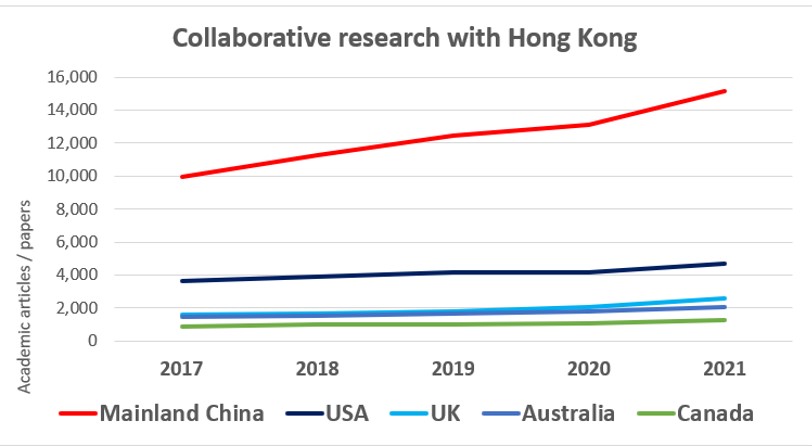
After nearly three years of pandemic-related restrictions, normal travel to and from Hong Kong fully resumed early this year. Key stakeholders in the Hong Kong higher education sector regard the UK sector as an important strategic partner and are keen to re-energise partnerships and collaborations which may have suffered during the pandemic.
Recent changes to Hong Kong’s geopolitical environment will inevitably impact how and where UK HE institutions choose to focus their future engagement with the territory. While there are still many opportunities to pursue, catalysed by initiatives such as the development of the Greater Bay Area (GBA)[1], there needs to be greater awareness and closer scrutiny of the potential risks.
Context
Recent national and local government strategies aim to increase the level of integration between mainland China and Hong Kong, with a number of relevant priorities set out in China’s National 14th Five-Year Plan. Specifically, the Plan indicates support for Hong Kong to reinforce and enhance its competitive advantages, to integrate into the overall development of the country and to proactively take forward the development of the Guangdong – Hong Kong – Macao Greater Bay Area (GBA). In the area of higher education, the strategic focuses are to encourage co-operation and exchange among higher education institutions in Hong Kong, Guangdong and Macao, jointly set up laboratories and research centres, as well as to share and commercialize scientific research outcomes.
Apart from the strategies related to the GBA, the Five-year Plan has also identified eight areas in which Hong Kong has strong potential to be an international or regional centre. Collectively known as the eight centres, these include the international financial centre; international innovation and technology centre; East-meets-West centre for international cultural exchange; international trade centre; international shipping centre; international aviation hub; centre for international legal and dispute resolution services in the Asia‑Pacific region; and regional intellectual property trading centre.
Investment in Research
While Hong Kong is considered as having had a later start in promoting research and development, the HKSAR Government has recently made unprecedented investment on research despite difficult economic environment. These include the funding for 1,600 new Postgraduate Research places and the establishment of InnoHK research clusters—Health@InnoHK and AIR@InnoHK—which aims to attract world-leading universities and research institutes to collaborate with local universities in setting up 28 research laboratories. The government has also established a HK$10 billion (around £1 billion) "Research, Academic and Industry Sectors One-plus Scheme" (RAISe+ Scheme) to support commercialisation of R&D outcomes by university research teams.
Greater Bay Area
There are encouraging signals from Hong Kong government that there is a willingness to engage with the international community, including the UK, with HE continuing to be a priority, with an emphasis on research and innovation. The recent government budget has committed HK$6bn (around £600 million) for research centres on life sciences and HK$3bn (£300 million) on AI and quantum-based research. This underlines the strategic importance of the sector for Hong Kong government.
Besides, there are several new initiatives implemented by the Research Grants Council Hong Kong[2] recently:
- Young Collaborative Research Grant HK$50 million (£5 million): to enrich the experience of young researchers in collaborative research
- Strategic Topic Grant (STG) HK$150 million (£15 million): to support collaborative research in specific areas which can help Hong Kong overcome imminent challenges and tap fast-evolving opportunities
Increased integration across the Greater Bay Area – a region covering Hong Kong, Macao and nine nearby cities in mainland China’s Guangdong province – is a key national strategy going forward. Many Hong Kong universities are establishing or already operate branch campuses in this region, and those who haven't done it are either in negotiations for new campuses or research facilities. Hong Kong institutions see alliances and partnerships with mainland and other foreign counterparts in the GBA as possible collaborative models to further pursue their research ambitions.
UK-Hong Kong Collaborations in Research
The UK is Hong Kong’s third largest research partner in terms of the number of collaborative publications, after China and the US. Medicine is the leading collaborative area.

In recent years, Hong Kong has been affected by US businesses withdrawing from the territory or reducing headcount based in Hong Kong. Tensions in the bilateral relationship between the US and China have also impacted US-Hong Kong research collaborations, though the US remains the second most important research partner for the Hong Kong HE sector.
Hong Kong’s academic system is closely modelled on the UK system and there are still close ties between UK and Hong Kong HE institutions. Research collaborations between the UK and Hong Kong remain strong, despite the challenges of the past three years. There were 9,679 publications co-authored by researchers in the United Kingdom and Hong Kong over the last five full years (2017-2021), according to Elsevier. The scale has grown consistently over the last five years, from 1,597 in 2017 to 2,617 in 2021.
Opportunities to further grow UK-Hong Kong Research Collaborations
Following two roundtable discussions with PVCs and senior academic members from the UK and Hong Kong HE sectors hosted by the British Council in February and June of 2023, the following summarises key discussions around areas of challenges, mitigation and opportunities.
Strength of the UK
- Experience of research commercialisation
- The quality of the data held by UK universities (eg: UK data in areas such as genetics and social sciences is seen as world leading)
- Strong PhD programmes
Research themes of mutual interests
- Net zero
- New environmental clean technologies and climate science
- Healthy aging, public health covering infectious disease related research,
- Biomedical research
- Social sciences and humanities
- Big data
- Mathematics
- Genome science, adaptive 3D design. microbial resistance, urban wind dynamics
Challenges
- Mitigating geo-political tension
The changes to the geopolitical environment in Hong Kong might affect how and where UK HE providers choose to focus their future engagement with the territory. University leaders should consider carefully what are their offers to students and how they frame what they teach. There is caution about how best to engage with UK in Hong Kong as the relationship with Beijing has deteriorated.
There is concern by UK HE senior leaders that risk management is framed only in terms of the challenges, rather than both challenges and opportunities of research collaboration. Risk, including security and reputational risks, need to be managed effectively. However, more detail is needed to better inform collaboration, mitigate against challenges, and recognise opportunities.
UKRI established its trusted research and innovation (TR&I) work programme in response to the increasing need across the sector to help manage and provide guidance and support in ensuring collaborative activities are done safely and securely. Formal regulatory measures are clear. For example, the UK National Security and Investment Act which came into force in January 2022 gives the government the right to scrutinise and intervene in certain acquisitions made by anyone, including universities, businesses, and investors, that could harm the UK’s national security. However, it is not yet clear what impact the legislation will have on research collaborations.
It was proposed that to ensure sustainable commitment and success, clear governance and guidelines on the joint research model, commercialisation path and IP strategy must be defined at the onset.
2) Attracting high quality PhD candidates
Both sides acknowledge that attracting high quality PhD candidates are key priority to ensure intellectual vitality and boost research capacity. Joint PhD programs, with clear tangible and well-defined benefits for both sides can be explored – specifically involving partnerships with industry partners.
Next steps?
The British Council Hong Kong is keen to work with UK partners and stakeholders to help them navigate this complex environment by identifying the opportunities as well as identifying and mitigating the risks, promoting international values, and positioning the UK as a trusted partner. There is much that can be further explored vis-à-vis the UK’s relationships with Hong Kong. The ambitions of the Hong Kong institutions and the local government are impetus for a more buoyant and active research environment - making this a great opportunity for the UK to advance its relationships with Hong Kong higher education and together, build a strong research eco-system here in one of the strongest economy in Asia.
[2] Research funding in Hong Kong cannot cross borders. In response, many countries have created joint research funds with the UGC, but not the UK as yet. The British Council Hong Kong is currently facilitating the collaboration between UKRI and UGC, looking for opportunities to create joint research funds for key priorities area, such as health and arts and creative industries.

Add new comment
Please note that comments by non-members are moderated. They do not appear on the site until they have been approved. Comments by registered members appear here immediately. Your email address will not be published. All fields are required.